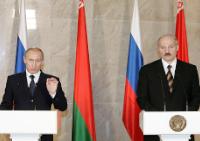On Dec. 13-14, Russian President Vladimir Putin and his Belarusian counterpart, Alexander Lukashenko, attended a conference on the potential union of Belarus and Russia in the Belarusian capital, Minsk. While such conventions have been held periodically since Russia and Belarus formed a loose political union in early 1996, this year's gathering has attracted special attention.
On Dec. 6, Russia's independent Ekho Moskvy radio station announced that the two presidents would meet in Minsk to sign a constitutional act formalizing the union between their countries. The Union would reportedly involve a common legislature, currency, and military. It is expected that referendums will be held in both Russia and Belarus to determine public opinion about the union, although no specific timetable for the votes have been set. Quoting sources in the Lukashenko administration, the station reported that Putin planned to become president of the new formation and Lukashenko its parliamentary speaker. However, presidential spokesmen in Moscow and Minsk have denied these rumors, saying that the constitutional act has not been finalized yet and that the two parties still need to review its draft.
Before Putin announced this week that he would accept an appointment to the position of prime minister if his designated successor, Dmitry Medvedev, is elected as Russia's next president, political analysts in Russia doubted Putin would be satisfied with this role. They speculated that he might be more amenable to a presidential post in the Russia-Belarus union -- a title that would satisfy his political ambitions and allow for a lawful extension of his term.

